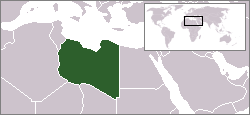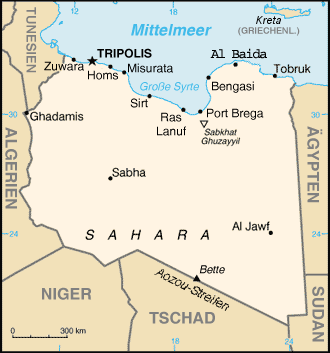| The Foreign Office of the Federal Republic of Germany has one for this country Travel warning released (Web link). “We warn against traveling to Libya. All Germans who have not yet left the country will be asked to leave Libya. ”Date of the last travel warning: February 17, 2020. |
| The Austrian Foreign Ministry has one for this country Travel warning released (Web link) “We warn against traveling to Libya. Austrians are urged to leave the country. ”Date of last travel warning: 21.02.2020. |
| location | |
 | |
| flag | |
 | |
| Short dates | |
| Capital | Tripoli |
|---|---|
| Form of government | People's Republic on an Islamic basis |
| currency | 1 Libyan dinar (LD) = 1,000 dirhams |
| surface | 1.76 million km² |
| population | 5.63 million |
| languages | Arabic, Tamazight |
| Religions | Sunni Muslim 97% |
| power grid | 230 V / 50Hz |
| Internet TLD | .ly |
| Time zone | UTC 1h (CET) |
Libya located in North africa. Bordering countries are Tunisia, Algeria, Niger, Chad, Sudan and Egypt.
Regions

The country is divided into the traditional landscapes
- Tripolitania in the West,
- Fezzan in the south,
- the Cyrenaica (Cyrene) in the east and
- the Libyan desert
on. Only 2.5% of the area can be used for agriculture, enormous oil and natural gas reserves make up for this deficiency. Libya is the only country in the world that doesn't have a single constant river. There are only so-called "wadis".
Cities
- Benghazi - second largest city; economic center of Cyrenaica.
- Tobruk - important port city in Cyrenaica and the end point of an oil pipeline.
- Tripoli - Capital.
Other goals
The ancient sites of Leptis Magna and Sabrata are among the most famous relics of antiquity. Unfortunately, since recently (as of January 09) they can only be viewed if a Libyan agency is involved and a local guide is there.
background
Even the early advanced civilizations of antiquity settled in today's Libya and left valuable archaeological evidence. In the following period, the inhospitable country was settled by various nomadic cultures until the Ottoman Empire incorporated what is now Libya in the 16th century.
In the early 20th century Italy aspired to its own colonial empire and conquered the geographically nearby Libya from the Ottomans, but could not hold power in the country against local rebel groups. It was not until 1934, after a bloody war, that the country was conquered under General Mussolini. A few years later, Italy, as a losing country, had to cede the colony of Libya, which was then granted independence as a monarchy.
In 1969, the Islamic Colonel Gaddafi came to power and drove the secular king of Libya into exile. For more than 30 years he led the country with a hard hand, leaving all key companies, especially the oil industry, in state hands and thus brought Libya to prosperity among the African countries.
The Arab Spring led to a geopolitical catastrophe in Libya: after a military intervention by the US, Gaddafi was overthrown and the country has since fallen into a civil war that continues to this day. Like Somalia, Libya is now considered a failed state without any state structures and without functioning state authority, so that rebels, smugglers and Islamists have a free hand. The country, which has never been important for tourism, has since then been almost inaccessible to foreigners and also very dangerous.
getting there
There has been no central government in the country since the American intervention that led to the assassination of Colonel Gaddhafi. It is not clear where and how entry permits can be obtained. The following information still relates to the "good old days:"
Entry requirements
A visa is required to travel to Libya. The issuance of a visa requires a passport that is valid for at least 6 months (from entry). Children generally need their own passport.
Due to the lack of an effective central government since the US-led coup in 2011, it is not always clear in 2018 which government controls which regions. The information on the Libyan embassy website in Berlin have not been maintained since 2014. In any case you have to inquire under the telephone number there. It appears that if you do not have a guarantor, you will be required to compulsorily exchange US $ 1000 upon arrival. The most up-to-date information can be obtained from the consulates in Cairo (EG ، 11568, Al Gabalayah, Zamalek) or Tunis.
By plane
Most of the airports in the country were destroyed by the civil war. Only the Mitiga military airfield near Tripoli is in operation today, and is mainly served by other African cities; There are no direct flights from Europe.
By train
The Tripoli - Al Zawiah - Sabratha - Zuara - Zeltin - Abu Kamash - Ras Ejdeer railway is under construction. In spring 2007 there were no passenger trains yet. Another railway line is planned from the coastal town of Sirte to the Sabha oasis in the Sahara.
By bus
In Tripoli and Benghazi there is a public bus network with three price zones. The buses are overcrowded and run irregularly. There is a regular bus service between Tripoli and Benghazi, and a minibus between Benghazi and Tobruk. Visitors to the desert regions need a so-called desert pass from the Libyan authorities before they start their journey (can be obtained from the tour operator).
In the street
Right-hand traffic applies on the roads. The country's road network covers around 85,000 km. Roads lead from Tunisia, Algeria, Niger, Chad and Egypt to Libya. The coastal road is the most important passage and runs almost exactly from west to east. Some of the larger roads also lead inland, including after Sebha, Ghadames and Kufra. Since 1969 only street signs with Arabic script have been allowed. There is hardly any signage outside of larger towns. Petrol is available everywhere and very cheap, city maps hardly exist. Repairs are often carried out unreliably, and spare parts are rarely available immediately. Rental cars are currently mainly offered in Tripoli and Benghazi. EU or Swiss driving licenses (Permit Conduire) are valid for three months, after which a Libyan driving license is compulsory. Entry with your own vehicle (including transit) is only permitted with a local guide.
The fuel supply (diesel and petrol) is sometimes quite difficult. Petrol stations are sometimes "dry" for several days, even on the stretch of the Mediterranean (Zuara to Al Khums). In the case of diesel, the situation is occasionally even worse, as it is often not issued on the grounds that it is only for military vehicles. This means that you should replenish all supplies at every opportunity. The diesel price is (as of 01/09) around 0.19 ly.
By boat
Regular ferries from Genoa and Naples to Tripoli and Benghazi. Car ferries operate between Tripoli and Malta as well as various Italian port cities.
mobility
When driving your own vehicle you have to be prepared for numerous control points. These checkpoints are manned by either the military or the police. Here, too, nothing goes on without agency papers and a local companion.
language
The state language is classical Arabic. Libyan Arabic is spoken. All public signage is in Arabic. Of several minority languages, the "Nafusi" is worth mentioning, as it is spoken by almost 200,000 people in the west of the country and in Tunisia. The most widely used foreign language is still Italian (Libya was an Italian colony), followed by French (many Libyans like to visit Tunisia by car). English is increasingly understood and often spoken by younger and more educated Libyans.
to buy
The currency is the Libyan dinar. Foreign currencies such as euros or US dollars can be exchanged in some hotels, banks and exchange offices. The acceptance of credit cards is low. Most likely these will be in Tripoli and Benghazi accepted. ATMs are also rare - at least in Tripoli there are said to be some that also accept European cards.
kitchen
Libyan cuisine is similar to Tunisian, which is also part of the Maghreb cuisine. A lot of pasta is cooked and there are many traces of Italian in Libyan cuisine.
Work
Due to the growing industrialization, oil production in the Sahara and various industrial projects, craftsmen and engineers were particularly in demand in Gaddhafi's time. In the area between Tazirbou and Rebiana, a Libyan-Spanish consortium (with German subcontractors) is carrying out new oil test wells, apparently successfully, so that there are most likely job opportunities in this branch of industry.
public holidays
| date | Surname | importance |
|---|---|---|
| September 1st | Revolution day | Anniversary of the Revolution of September 1, 1969 |
| December 24th | Independence day | on December 24th, 1951, Libya gained independence from Italy |
All Sunni Islamic holidays are celebrated. These are based on the lunar calendar.
security
As a result of the coup, the security situation can be described as very tense overall. The accommodation should not be left after dark.
The wadis only temporarily carry water after heavy rainfall. Travelers who camp in wadis can be surprised by sudden rainfall and endanger their lives.
health
Schistosomiasis: Occurrence in fresh water, especially in the area of Derna, Fessan, Tauorga.
Kala Azar: (Leishmaniasis): nationwide occurrence. Protection against mosquitoes by clothing that covers the skin. Use of insect repellants (creams, lotions, sprays), close-meshed mosquito nets.
climate
The annual average temperatures are between 20 and 25 ° C and can even be up to 50 ° C in summer. The water temperatures in the Mediterranean are 16-17 ° C in January and 28-31 ° C in August.
Rules and respect
Libya is an Islamic country, so the usual rules of conduct for Islamic countries should be observed. This applies to clothing (shorts and skirts are more of a taboo) and headgear (in mosques, people wear headgear).
taking photos
In Libya, it is forbidden to take photographs of public buildings, ports, airports, military facilities and vehicles, industrial facilities, bridges, embassy buildings, uniforms and uniforms as well as interior views of mosques and tombs. Failure to comply could result in arrests and / or confiscation of equipment. Photographing the road traffic outside of built-up areas can also be viewed critically. Permission should be sought when photographing people. This is especially true if you as a man want to photograph a woman. Here you should also ask the male companion (if available) for permission.
Post and Telecommunications
The GSM cellular network is covered by two operators: AL MADAR Telecomm Company and Libyana Mobile Phone. SIM cards from abroad do not work in Libya. The Internet is censored in Libya, among other things. The websites of all Libyan rebel groups and everything that is incompatible with a strict interpretation of the Koran are blocked.
For a longer stay or for desert tours, a is recommended Satellite phone the Thuraya Satellite Telecommunications Co. Devices can be borrowed in almost all European countries.
Foreign missions
Germany, Austria and Switzerland have withdrawn their consular staff. Corresponding tasks were assigned to the departments in Tunis transfer
literature
Web links
- Libya.net - Travel tips, descriptions of the sights, travel reports and a blog on current events
